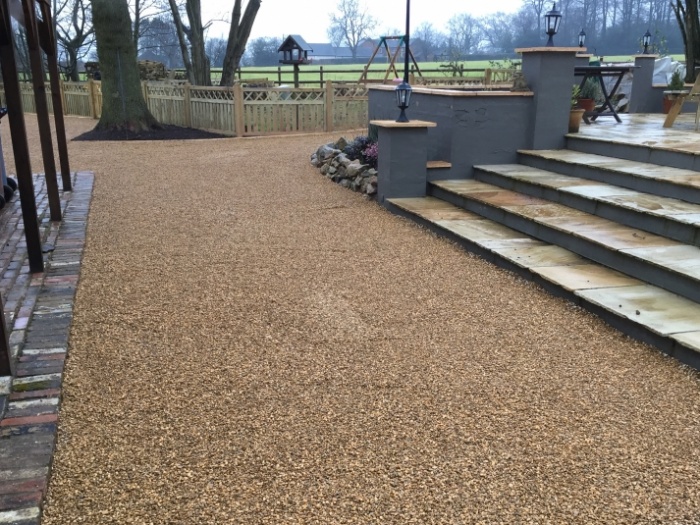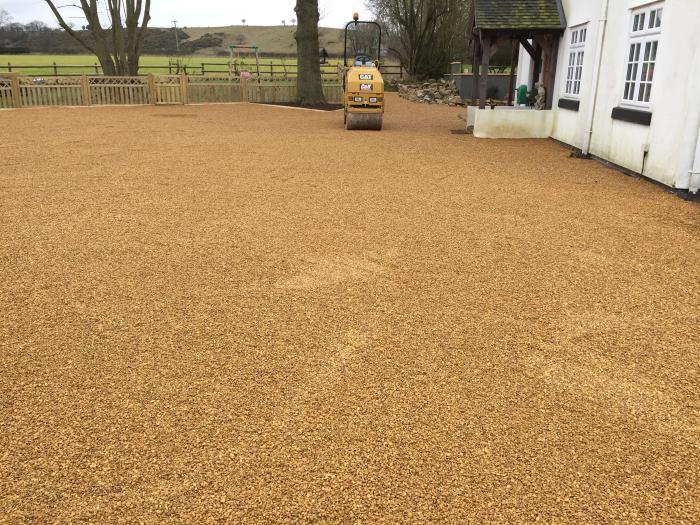Unbound surfacing is commonly used as a cheaper alternative to bound surfaces where there is relatively light traffic or where a more natural look is required to a driveway, road, car park or outdoor area.
Many customers choose an unbound surface where a formal layout is required, but a natural effect is preferred. Unbound surfacing mostly includes the use of decorative gravel and stone for such projects as domestic driveways, parkland footpaths or car parking areas.
Customers prefer the unbound nature of the material, the variety of finishes and the lower price; it is much more cost-effective than bound surfacing and can usually be laid much more quickly.
Unbound surfacing is becoming more popular than ever these days due to the rising cost of crude oils which will regularly inflate the price of tarmacadam or bitumen surfacing projects.
In laying an unbound surface, the work is often carried out in the same manner as bound surfaces, using the same techniques and often the same tools.
Whereas tarmacadam is a surfacing option that sets and goes very hard once the material's temperature had dropped, unbound surfacing does not require the material to be shaped and laid immediately after delivery to the site.
In addition to the variety of colour and the of aggregates used in unbound surfacing, it can make for improved security around domestic and commercial properties.
Laying loose aggregates on the area to be surfaced is less labour intensive than surfacing with a bound material, and it eliminates the need for a large team of work people thus reducing labour and machinery costs.
There are several factors to consider when laying unbound surfaces. The nature of the ground and drainage are significant factors in determining the type of construction required.
Usually, unbound materials are laid to a depth of 125mm to prevent water rising through the base layer and protecting from frost heave. Compaction rates, surface treatments and drainage must also be considered when laying unbound surfaces to avoid puddles forming in wet weather and to ensure a pleasant but robust surface for all users to enjoy safely.
Materials used for unbound surfacing can vary widely, from free draining sands and rounded gravels to relatively closer bonding material with some clay content to bind the particles together when compacted with a roller. Popular materials for unbound surfacing include whinstone, limestone or granite. The particles can vary in size from large stones to fine dust.
Much will depend on the nature of the ground where the driveway, path or parking area is o=ro be constructed. On hard, free draining soils it is advisable to dig out a full tray to a depth of at least 100mm and, following compaction and rolling, add another 25mm surface layer.
On soft surfaces, it may be advisable to 'raise' the whole surface and line the base with a geotextile for geogrid to ensure the surface is robust in all weathers.
Once an unbound surface is in place, regular maintenance is required to ensure it delivers good service for as long as possible. When selecting the design and materials, it is a good idea to factor in the maintenance regime required to ensure it remains in good condition for as long as possible.
The main reasons why unbound surfacing is now proving so popular are:
- Cost-effectiveness
- Aesthetically pleasing
- Wide choice of materials and colours
- Fast installation period
- Good security measure
- Low maintenance costs
If you require any more information about unbound surfacing and how we can assist with your project, then please do not hesitate to CONTACT US with your needs.








